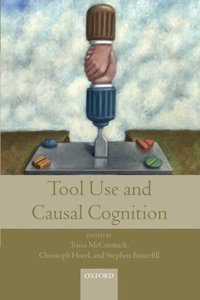Only logged in customers who have purchased this product may leave a review.
Sale!
Tool Use and Causal Cognition (Hardback) | Released: 01 Dec 2011
By: Christoph Hoerl (Author) Publisher: Oxford University Press, USA33.00% Off Original price was: 5,579.00$.3,738.00$Current price is: 3,738.00$.
You save 1,841.00$
What cognitive abilities underpin the use of tools, and how are tools and their properties represented or understood by tool-users? Does the study of tool use provide us with a unique or distinctive source of information about the causal cognition of tool-users? Tool use is a topic of major interest... Read More
In stock
Ships within 1-2 Business Days

100% Orginal Books

Easy Replacement

Certified product

Secure Checkout

On time delivery
Author:
![]()
Christoph Hoerl
Publisher Name:
![]()
Oxford University Press, USA
Language:
![]()
English
Binding:
![]()
(Hardback)
About The Book
What cognitive abilities underpin the use of tools, and how are tools and their properties represented or understood by tool-users? Does the study of tool use provide us with a unique or distinctive source of information about the causal cognition of tool-users? Tool use is a topic of major interest to all those interested in animal cognition, because it implies that the animal has knowledge of the relationship between objects and their effects. There are countless examples of animals developing tools to achieve some goal-chimps sharpening sticks to use as spears, bonobos using sticks to fish for termites, and New Caledonian crows developing complex tools to extracts insects from logs. Studies of tool use have been used to examine an exceptionally wide range of aspects of cognition, such as planning, problem-solving and insight, naive physics, social relationship between action and perception. A key debate in recent research on animal cognition concerns the level of cognitive sophistication that is implied by animal tool use, and developmental psychologists have been addressing related questions regarding the processes through which children acquire the ability to use tools. In neuropsychology, patterns of impairments in tool use due to brain damage, and studies of neural changes associated with tool use, have also led to debates about the different types of cognitive abilities that might underpin tool use, and about how tool use may change the way space or the body is represented. Tool Use and Causal Cognition provides a new interdisciplinary perspective on these issues with contributions from leading psychologists studying tool use and philosophers providing new analyses of the nature of causal understandingA ground-breaking volume which covers several disciplines, this volume will be of interest to psychologists, including animal researchers and developmental psychologists as well as philosophers, and neuroscientists.About the Author: Teresa McCormack is Professor of Developmental Psychology at the School of Psychology, Queen's University Belfast. She was co-director of the AHRC-funded project on Causal Understanding based at the University of Warwick. Her research primarily addresses issues concerning children's temporal and causal cognition. She has published two co-edited interdisciplinary books: Time and Memory: Perspectives in Philosophy and Psychology (OUP, 2001), with C. Hoerl, and Joint Attention and Communication (OUP, 2005), with N. Eilan, C. Hoerl, and J. Roessler. A further volume entitled Understanding Counterfactuals, Understanding Causation, co-edited with C. Hoerl and S. Beck is forthcoming with OUP. Christoph Hoerl is Associate Professor (Reader) in Philosophy at the University of Warwick. Between 2004 and 2008, he was co-director (with Teresa McCormack and Johannes Roessler) of the interdisciplinary AHRC Research Project 'Causal Understanding: Empirical and Theoretical Foundations for a New Approach'. With Teresa McCormack and Sarah Beck, he is co-editor of Understanding Counterfactuals, Understanding Causation (OUP, forthcoming). Stephen Butterfill is Associate Professor in Philosophy at the University of Warwick. His research focuses on philosophical issues in developmental psychology.








Reviews
There are no reviews yet.